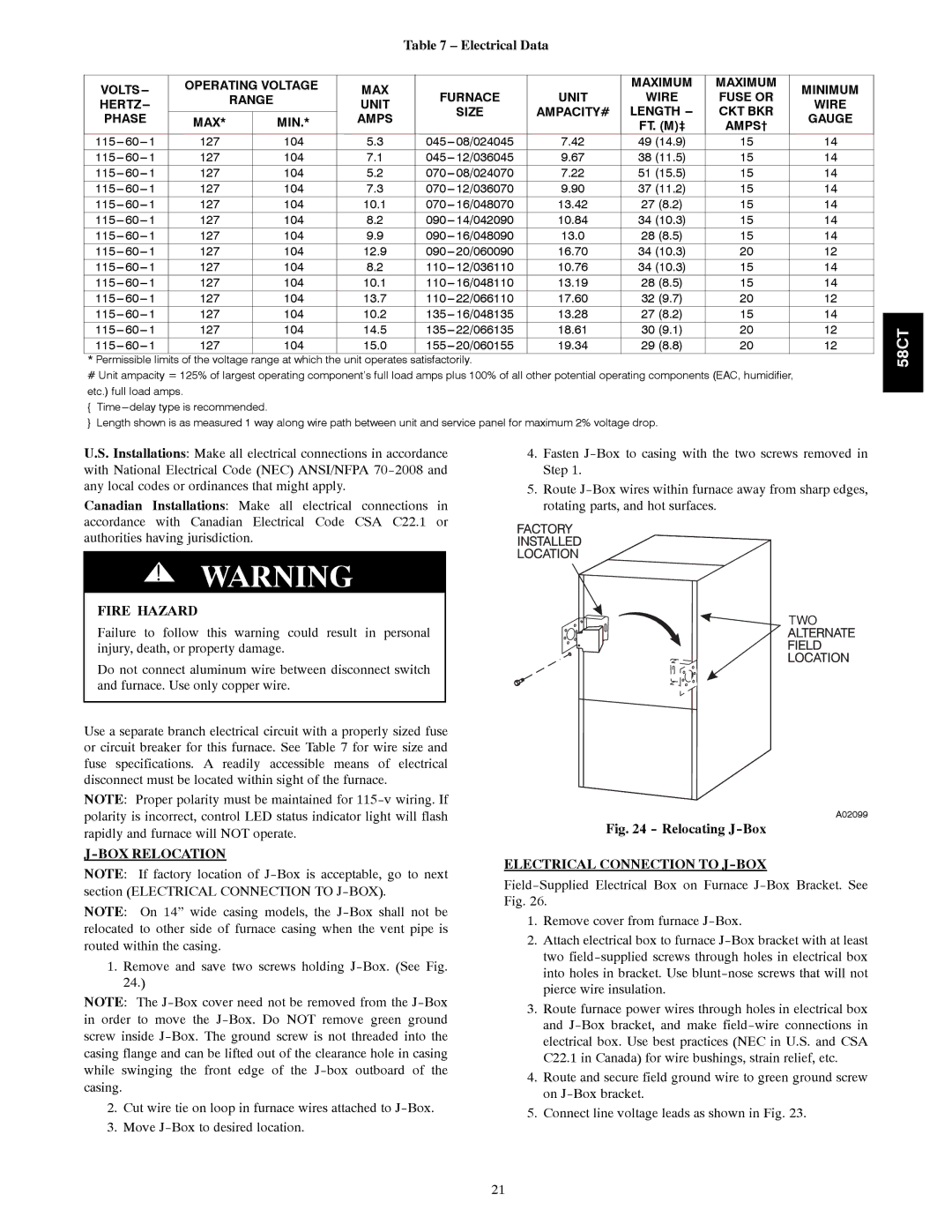
Table 7 – Electrical Data
VOLTS |
| OPERATING VOLTAGE | MAX |
|
|
| MAXIMUM | MAXIMUM | MINIMUM | ||
|
| RANGE | FURNACE | UNIT | WIRE | FUSE OR | |||||
HERTZ |
|
| UNIT | WIRE | |||||||
|
|
| SIZE | AMPACITY# | LENGTH | CKT BKR | |||||
PHASE |
| MAX* | MIN.* | AMPS |
| GAUGE | |||||
|
|
|
| FT. (M)‡ | AMPS† | ||||||
1 | 127 | 104 | 5.3 | 08/024045 | 7.42 | 49 (14.9) | 15 | 14 | |||
1 | 127 | 104 | 7.1 | 12/036045 | 9.67 | 38 (11.5) | 15 | 14 | |||
1 | 127 | 104 | 5.2 | 08/024070 | 7.22 | 51 (15.5) | 15 | 14 | |||
1 | 127 | 104 | 7.3 | 12/036070 | 9.90 | 37 (11.2) | 15 | 14 | |||
1 | 127 | 104 | 10.1 | 16/048070 | 13.42 | 27 (8.2) | 15 | 14 | |||
1 | 127 | 104 | 8.2 | 14/042090 | 10.84 | 34 (10.3) | 15 | 14 | |||
1 | 127 | 104 | 9.9 | 16/048090 | 13.0 | 28 (8.5) | 15 | 14 | |||
1 | 127 | 104 | 12.9 | 20/060090 | 16.70 | 34 (10.3) | 20 | 12 | |||
1 | 127 | 104 | 8.2 | 12/036110 | 10.76 | 34 (10.3) | 15 | 14 | |||
1 | 127 | 104 | 10.1 | 16/048110 | 13.19 | 28 (8.5) | 15 | 14 | |||
1 | 127 | 104 | 13.7 | 22/066110 | 17.60 | 32 (9.7) | 20 | 12 | |||
1 | 127 | 104 | 10.2 | 16/048135 | 13.28 | 27 (8.2) | 15 | 14 | |||
1 | 127 | 104 | 14.5 | 22/066135 | 18.61 | 30 (9.1) | 20 | 12 | |||
| 1 | 127 | 104 | 15.0 |
| 20/060155 | 19.34 | 29 (8.8) | 20 | 12 | |
* Permissible limits of the voltage range at which the unit operates satisfactorily.
#Unit ampacity = 125% of largest operating component’s full load amps plus 100% of all other potential operating components (EAC, humidifier, etc.) full load amps.
{
} Length shown is as measured 1 way along wire path between unit and service panel for maximum 2% voltage drop.
58CT
U.S. Installations: Make all electrical connections in accordance with National Electrical Code (NEC) ANSI/NFPA
Canadian Installations: Make all electrical connections in accordance with Canadian Electrical Code CSA C22.1 or authorities having jurisdiction.
!WARNING
FIRE HAZARD
Failure to follow this warning could result in personal injury, death, or property damage.
Do not connect aluminum wire between disconnect switch and furnace. Use only copper wire.
Use a separate branch electrical circuit with a properly sized fuse or circuit breaker for this furnace. See Table 7 for wire size and fuse specifications. A readily accessible means of electrical disconnect must be located within sight of the furnace.
NOTE: Proper polarity must be maintained for
J-BOX RELOCATION
NOTE: If factory location of
NOTE: On 14” wide casing models, the
1.Remove and save two screws holding
NOTE: The
2.Cut wire tie on loop in furnace wires attached to
3.Move
4.Fasten
5.Route
TWO
A02099
Fig. 24 - Relocating J-Box
ELECTRICAL CONNECTION TO J-BOX
1.Remove cover from furnace
2.Attach electrical box to furnace
3.Route furnace power wires through holes in electrical box and
4.Route and secure field ground wire to green ground screw on
5.Connect line voltage leads as shown in Fig. 23.
21
